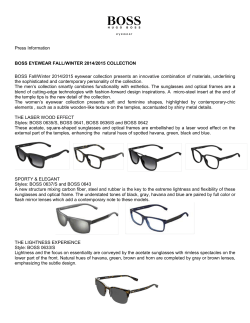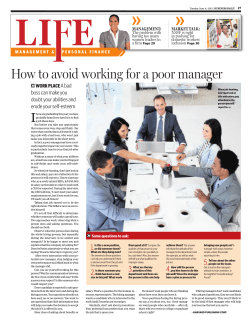
Bonus WhitepaperâThrough the Looking Glass
Through the Looking Glass How do your employees view you as a manager? On the minds of most managers is the question, “What are my strengths and greatest needs for improvement?” Second, managers want to know, “How do my employees view me as their leader?” Both of these questions relate to self-image. How you view your own performance has a significant impact on your relationship with others. The Emerald City in The Wizard of Oz only appeared green because of the green glasses everyone wore. Similarly, how you view yourself as an employee and a manager creates a “filter” through which you evaluate other relationships. The self-image filter affects us in many ways; it provides motivation for our work, it shapes the way we perceive the world, it provides a way to judge our own behavior, it is projected in the way we deal with others, and it is the cornerstone of something we all want – self-respect. Psychology 101 taught us two important things about self-image. First of all, it is learned. Selfimage is not something we inherited from mom and dad. Second, self-image comes from feedback. Feedback is the report card that we get from others in response to our actions. For example, someone tells you you’re good with computers. Pretty soon you get a reputation as someone who can provide help with computer questions. You find yourself working harder to stay ahead of the pack to maintain the self-image of someone who has great computer skills. As your confidence grows, desire to improve increases, your skills improve, and your self-image is enhanced. It becomes a circle of constant skill development and improvement. 2 On the other hand, someone says you’re not very good at public speaking. The next time you have to give a speech this thought keeps repeating itself in the back of your mind. Suddenly, you can’t string three words together into a coherent sentence. These types of positive and negative examples of self-image have affected all of us. What they teach us is that since self-image is learned from the feedback we receive we can adapt; we can strengthen what we do well, and work on areas where our skills are not so strong. What does all this self-image stuff have to do with the manager/employee relationship? Plenty! The image you have of your employees and theirs of you provides the filter through which your relationship is developed. If the image is strong the relationship is positive, if the image is weak the relationship is negative. 11 Factors Influencing Your Image The following eleven factors play a significant role in the development of image between a manager and an employee. Understanding these image builders will make you more effective as a leader in your organization. Frequency of Contact/Availability If someone were to ask one of your employees how they see you as a boss would they say, “I don’t know, I never see him”, or “I only see her when there are problems.” Or would your employee answer, “I see her all the time, she’s always available to help. I like her and trust her.” Managers who are always on the go, hard to get a hold of, or difficult to find are liable to have employees who judge them based on limited information. In today’s age of E-Mail, message machines, and audix systems, employees who complain that their boss is hard to find, let alone talk to, are becoming more and more common. The boss who gains personal productivity by working at home two days a week, and keeps their office door shut for three days may get a lot of work done, but they are compromising their leadership position. Nothing can substitute for a manager who is seen frequently, and is available to their employees. Approachability Employees must be able to get in your door and feel comfortable talking to you. Do your employees know when the best time to see you is? The more an employee feels they can bring any problem to you the more likely they will seek your assistance. Being approachable is key. When an employee comes to you do you greet them at the door warmly with an enthusiastic handshake, invite them to sit down, and give them your undivided attention? If you don’t, employees will leave thinking they are unimportant to you. RONKELLEHER.COM © Ron R. Kelleher 3 Walk-Abouts Sam Walton’s famous trips to visit his stores have heightened awareness of the importance of meeting employees in their work place. It’s easier to understand the difficulties of managing a production line bottleneck if you’re in the plant looking at the problem, talking directly to the people who deal with the problem. Employees feel important when the boss comes to them and communications are more open. Open Door Do employees picture you looking like Scrooge behind your desk? Productive employees feel comfortable sharing difficult problems with their boss because they know the boss will listen and render fair decisions. Some managers make a pretense of having an open door policy; they smile, they talk a great game, and they say they want to hear about your success and your failure. In reality, they only want to hear the “company line – no real problems please”. It doesn’t take an employee long to learn not to seek advice from this kind of boss. Open Communications Open communications in the office is absolutely necessary. If an employee can find you and can get past your secretary to see you, but can’t communicate openly with you for fear of recrimination, you’ll soon lack vital information you need to keep the business profitable. Don’t deceive yourself. If employees think they’ll be misunderstood, or that valid concerns will tag them as a “complainer”, they won’t come to you for advice. If they don’t come to you with their ideas, problems, and solutions you’ll be out of business in short order. The competitive business environment we’re in will not suffer fools for long. Clear Expectations Do a survey about what employees want from a boss and the answer in more cases than not will be, “I want to know exactly what he wants me to do.” This doesn’t mean the employee can’t or doesn’t want to be self-directing, but it does mean they need clearly defined boundaries, and clearly defined goals and objectives. Fair Performance Reviews Performance reviews are usually conducted quarterly, semi-annually, or annually. They are the formal opportunity for the manager and the employee to discuss performance related issues. Employees want to know how they are doing. They value hearing the confirmation from the boss. RONKELLEHER.COM © Ron R. Kelleher 4 Performance reviews are difficult for the manager because they require significant time commitments. A review that includes general comments like, “You don’t usually get the job finished on time,” isn’t helpful. In a fair review the employee needs to know exactly what was done wrong and when; very specific examples are mandatory. Preparing specific examples for a performance review will take time, organization, and considerable thought. If you’re doing a good job of providing feedback to your employees, nothing said in the formal performance review should ever come as a surprise to the employee. Subordinate Review Subordinate review of the manager is becoming a common practice. Usually linked to the performance review process, it is the employee’s opportunity to provide feedback to the boss. If the boss and the employee have a good working relationship there should be no surprises. For the vast majority of employees however, there is a reluctance to be very candid about the boss for fear of what might happen later. For this reason subordinate review of the boss is sometimes done on a confidential basis between the employee and the boss’s boss. However it is accomplished, subordinate review of the manager is a valuable tool that should be used and expanded throughout all levels and business disciplines. Provide Recognition Barnabas was known as the “encourager”. As a manager you should look for ways that you can provide encouragement to your employees. When an employee does a particularly good job do you regularly compliment them? Do you let your bosses and others in the organization know about your employees when they do outstanding work? When an employee is working to improve their skills in a given area do you encourage their progress? Do you build them up, or do you chasten them for not learning faster? What you say can encourage or discourage, but don’t forget the impact of what you don’t say, the smile, or the frown. Each of these is a mirror of your feelings that the employee will pick-up on instantly. Share Information Employees want to know how the work they’re doing fits into the big picture. RONKELLEHER.COM © Ron R. Kelleher 5 If employees understand how the work they do contributes to the company vision, they will make better decisions in their day-to-day work. There’s nothing like an employee who understands the effect on the pocket book of having a 10% reject rate when a 1% rate is achievable. Also, sharing important, pertinent information with your employees will create an atmosphere in which they will be more likely to share information with you. Employee Development Knowledge translated into a technology that brings a new product to market will be the lifeblood of companies that survive and prosper in the 21st century. Providing continuing education and training for all your employees will be the only way to insure a steady flow of new ideas and competent workers. Given the cost of hiring and training an employee you might consider this, how would you handle your personnel if you couldn’t fire them, and couldn’t get any new employees? If you want to survive you’ll make sure that they are well trained in all the current technologies and industry information – regardless of the cost. Getting Started How do employees and peers view you as a manager? Ask yourself the following questions. As you consider your answers think about how you really come across to people, and how you usually react to different situations. If you’re really honest about the answers you’ll know how your employees and peers view you as a manager. Do you have frequent contact with your employees? Do your employees feel comfortable coming to you? Do you have contact with your people at their work place? Do your employees freely discuss difficulties with you? Do you seek input from your employees? Do you always make sure that job expectations are clearly communicated and understood? Do you provide your employees with fair, constructive job performance reviews? Do you ask your employees how they see you as a leader? Do you support your employees by giving credit for jobs well done? Do you share relevant, important information about the company with your employees? Do you encourage your employees to continue to develop their skills through work related training? RONKELLEHER.COM © Ron R. Kelleher 6 We need to take a serious look into the “looking glass” to discern how others view us. The eleven questions above will provide a start. As Christians, we are to let our light shine before men in such a way that they see our good works, and glorify our Father (Matthew 5:16). To provide this light in the work place is our greatest opportunity for ministry. Don’t treat this responsibility lightly, people’s salvation is at stake. RONKELLEHER.COM © Ron R. Kelleher
© Copyright 2025










